Responsibility Myanmar's
The UN Refugee Agency has inked a deal with Bangladesh on voluntary returns of Rohingya refugees but said conditions in Myanmar are not yet conducive to a safe, dignified and sustainable repatriation.
A memorandum, signed by Foreign Secretary Shahidul Haque and UN High Commissioner for Refugees Filippo Grandi in Geneva, established a framework of cooperation on the repatriation in line with international standards.
However, the responsibility for creating conditions required for such returns rests with the Myanmar authorities, and these must go beyond the preparation of physical infrastructure to facilitate logistical arrangements, said the UNHCR.
The agency also said it has continued to call on the government of Myanmar to take concrete measures to address the root causes of displacement, in line with the recommendations of the Advisory Commission on Rakhine State.
One step Myanmar could immediately take is to provide UNHCR and other relevant actors with full and unhindered access to refugees' places of origin in Rakhine State, it added.
“The access to the places would enable UNHCR to assess the situation and provide information to refugees about conditions in the places of origin, as well as to monitor any possible future return and reintegration of refugees,” read a UNHCR statement.
The UN body noted that refugees in Bangladesh have said before considering returning to Myanmar, they would need to see concrete progress in relation to their legal status and citizenship, security, and their ability to enjoy basic rights at home in Rakhine State.
Nearly 700,000 Rohingyas fled military atrocities in Myanmar into Bangladesh since August last year, joining over 300,000 others, who escaped earlier waves of violence in Rakhine State, where they have been deprived of citizenship and other basic rights since 1982.
Myanmar denies the accusations of genocide and ethnic cleansing and said the military action was in response to insurgent attacks on police posts on August 25.
The UNHCR said it would like to extend its sincere thanks to the government and people of Bangladesh for the hospitality, protection, and assistance provided to the refugees from Myanmar.
The MoU is signed at a time when there has been uncertainty over Rohingya repatriation though Myanmar signed a bilateral deal with Bangladesh in November last year.
Subsequently, the two countries signed a physical arrangement, and in February Bangladesh handed over a list of 8,032 Rohingyas to Myanmar, which, however, until now has verified only some 700 refugees, making them eligible for return. No return has yet taken place.
Experts had suggested a tripartite agreement involving the two countries and UNHCR but Myanmar refused. In the absence of a tripartite agreement, the UNHCR has signed the MoU with Dhaka.
The refugee agency said together with UN Development Programme, it is negotiating with Myanmar for an agreement to outline the scope of cooperation between these agencies and Myanmar government in Rakhine State.
“The agreement would aim to set forth a framework for refugees' voluntary repatriation in line with international standards, aim to create conditions that are conducive to eventual voluntary repatriation, and provide humanitarian and development assistance for all people of Rakhine State.”
Another “practical measure”, it said, is to ease restrictions on movement for the internally displaced persons (IDPs) encamped in the central townships of Rakhine State to help build confidence among refugees in Bangladesh.
“Such concrete measures would help demonstrate to refugees that the government of Myanmar is committed to a sustainable solution.”
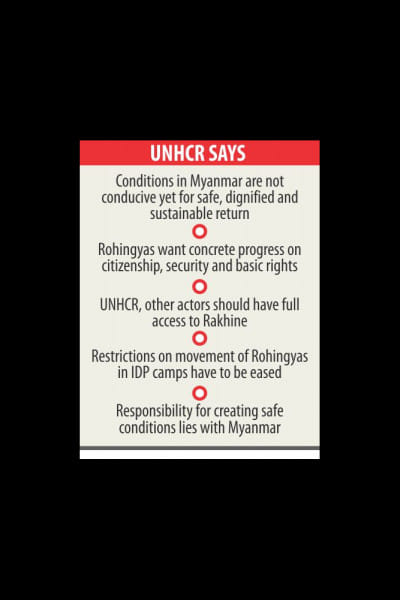
In a meeting with UNHCR officials after signing of the memorandum, Foreign Secretary Shahidul Haque discussed the current state of humanitarian response to the Rohingyas in Cox's Bazar camps.
“Both sides agreed to cooperate in relocation of Rohingyas to Bhashan Char,” reads a foreign ministry statement.
Asked about the MoU signed with the UNHCR, Bangladesh's Refugee Relief and Repatriation Commissioner (RRRC) Abul Kalam said it is an important development, especially as there are issues of ensuring voluntariness of the Rohingya returns and creating safe conditions back in Rakhine.
The UNHCR will ensure necessary protection, support and funding for management of the repatriation, he said.
Prof CR Abrar of international relations department at Dhaka University said that by signing the MoU with UNHCR, Bangladesh reaffirms its commitment to the refugees' right to voluntary return.
However, it is frustrating that the conditions in Myanmar are not in favour of repatriation at all, he said.
Besides, Myanmar's Social Welfare Minister Win Myat Aye during his visit to Bangladesh this week said the Rohingyas, on their return, have to apply for national verification cards “as migrants” as preconditions for citizenship.
“This is quite unacceptable,” Prof Abrar, also executive director of the Refugee and Migratory Movements Research Unit of DU, told The Daily Star.
It's good that Bangladesh has done its preparatory task by signing the MoU, and the rest will depend on how Myanmar creates the conditions for safe and voluntary returns and how the international community can put pressure on Myanmar, he added.
“It is very important that Bangladesh and the international community hold Myanmar accountable for genocide and mount pressure on Myanmar.”

 For all latest news, follow The Daily Star's Google News channel.
For all latest news, follow The Daily Star's Google News channel. 

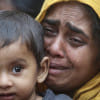

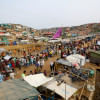
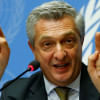
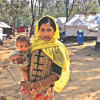


Comments